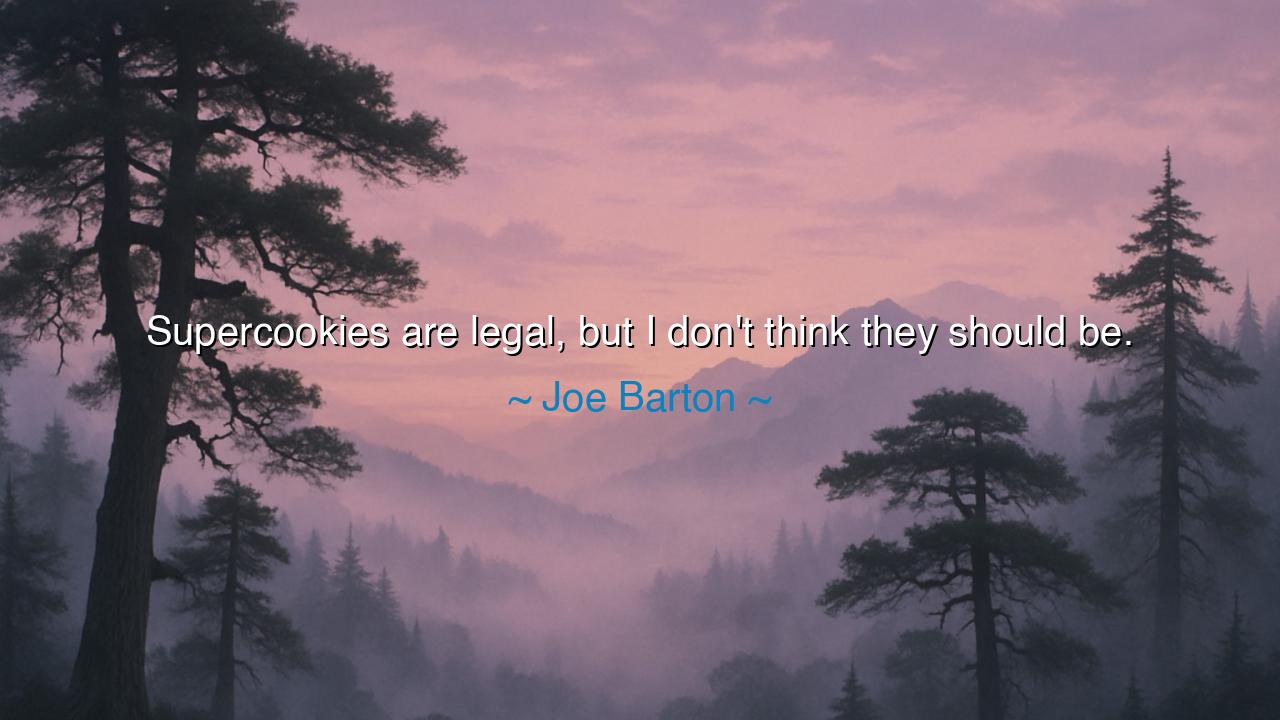
Supercookies are legal, but I don't think they should be.






In the words of Joe Barton: “Supercookies are legal, but I don’t think they should be.” Though the phrase may sound small, almost simple, within it lies a great truth about freedom, privacy, and the subtle ways in which power can bind men without chains. These words remind us that not all things permitted by the law are righteous, and not all things forbidden are unjust. Law may mark the boundaries of what is allowed, but morality asks us to look deeper, to question whether those allowances guard human dignity—or exploit it.
The ancients often warned that the greatest threats to liberty come not from open tyranny, but from unseen bonds. The supercookie, a hidden tool in the realm of the internet, is a mark left upon the traveler, a trace that follows him wherever he goes. It is legal, yet it intrudes upon the most private corners of a person’s life, gathering fragments of identity without consent. Barton’s words are an alarm, crying out that legality without justice is a hollow shield. For what is the worth of freedom if one’s steps are watched, one’s choices tracked, one’s secrets cataloged without permission?
Consider the tale of the Roman census. At first, it was a tool of governance, measuring the people so the empire might be ordered. But as time passed, it became a weapon of control, binding men more to the will of the state than to their own destinies. In the same way, supercookies, born in the service of commerce, risk becoming instruments of surveillance, turning every act of browsing into data owned not by the individual, but by unseen powers. What begins as convenience ends in captivity.
Barton’s statement also reflects a larger truth: that the pace of technology often outstrips the pace of law. In every age, new tools arise—printing presses, telegraphs, railroads, and now the boundless expanse of the digital world. At first, these tools seem neutral, even benevolent. Yet without wisdom, they are easily bent toward exploitation. The law, slow and deliberate, often lags behind, leaving gaps where injustice can flourish. Barton’s words are a call to vigilance, reminding us that legality does not guarantee righteousness, and that society must guard not only the letter of the law but the spirit of justice.
The deeper meaning of the quote is this: the preservation of privacy is essential to the preservation of freedom. A man watched constantly is not truly free, even if no chains bind his hands. When his every act is recorded, analyzed, and monetized, his individuality withers, his choices become shaped by unseen influence. The ancients called this slavery of the soul—when the will of man is guided not by his own reason, but by forces outside his control. Barton warns that even when hidden under legality, such practices corrode liberty at its root.
Let us remember the example of the whistleblowers and reformers who revealed mass surveillance in our own age. They showed that when privacy is dismissed in the name of security or profit, it is not easily restored. Like trust, once broken, it leaves scars upon the soul of a people. Yet their courage also revealed another truth: that the people, once awakened, can demand change, can insist that the law reflect not only power but principle.
So let this teaching endure: be not lulled into complacency by the word “legal.” Question whether a practice upholds dignity, whether it respects freedom, whether it honors the sacred realm of privacy that each person deserves. In your own life, guard your digital steps, learn the tools of protection, and speak boldly when you see rights eroded. For the great lesson is this: laws may fail to keep pace, but conscience must not. As the ancients taught, justice is not what is written on the scrolls of men, but what is carved upon the heart.






AAdministratorAdministrator
Welcome, honored guests. Please leave a comment, we will respond soon